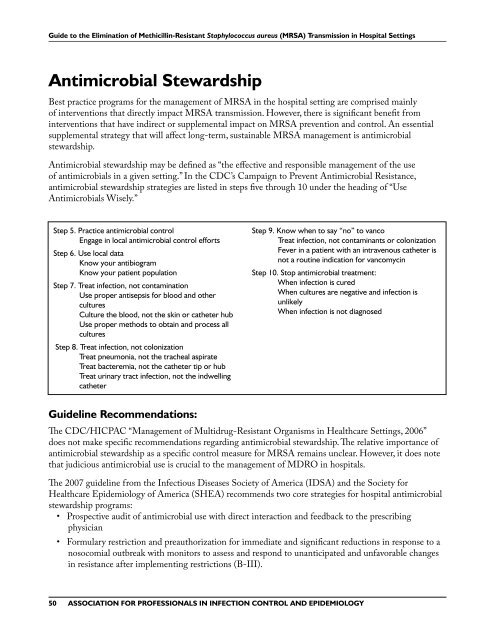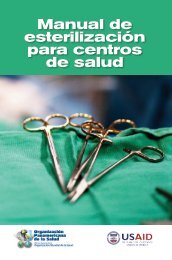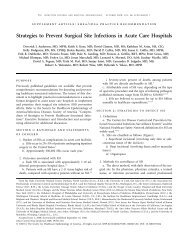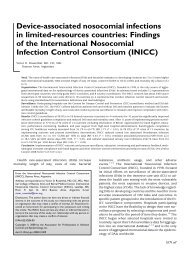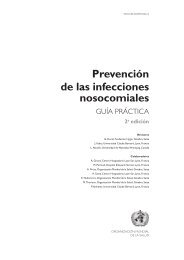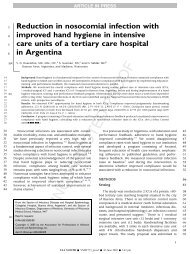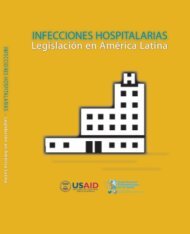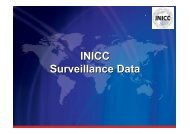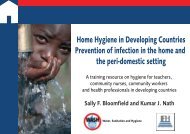APIC MRSA Elimination Guideline
APIC MRSA Elimination Guideline
APIC MRSA Elimination Guideline
Create successful ePaper yourself
Turn your PDF publications into a flip-book with our unique Google optimized e-Paper software.
Guide to the <strong>Elimination</strong> of Methicillin-Resistant Staphylococcus aureus (<strong>MRSA</strong>) Transmission in Hospital SettingsAntimicrobial StewardshipBest practice programs for the management of <strong>MRSA</strong> in the hospital setting are comprised mainlyof interventions that directly impact <strong>MRSA</strong> transmission. However, there is significant benefit frominterventions that have indirect or supplemental impact on <strong>MRSA</strong> prevention and control. An essentialsupplemental strategy that will affect long-term, sustainable <strong>MRSA</strong> management is antimicrobialstewardship.Antimicrobial stewardship may be defined as “the effective and responsible management of the useof antimicrobials in a given setting.” In the CDC’s Campaign to Prevent Antimicrobial Resistance,antimicrobial stewardship strategies are listed in steps five through 10 under the heading of “UseAntimicrobials Wisely.”Step 5. Practice antimicrobial controlEngage in local antimicrobial control effortsStep 6. Use local dataKnow your antibiogramKnow your patient populationStep 7. Treat infection, not contaminationUse proper antisepsis for blood and otherculturesCulture the blood, not the skin or catheter hubUse proper methods to obtain and process allculturesStep 8. Treat infection, not colonizationTreat pneumonia, not the tracheal aspirateTreat bacteremia, not the catheter tip or hubTreat urinary tract infection, not the indwellingcatheterStep 9. Know when to say “no” to vancoTreat infection, not contaminants or colonizationFever in a patient with an intravenous catheter isnot a routine indication for vancomycinStep 10. Stop antimicrobial treatment:When infection is curedWhen cultures are negative and infection isunlikelyWhen infection is not diagnosed<strong>Guideline</strong> Recommendations:The CDC/HICPAC “Management of Multidrug-Resistant Organisms in Healthcare Settings, 2006”does not make specific recommendations regarding antimicrobial stewardship. The relative importance ofantimicrobial stewardship as a specific control measure for <strong>MRSA</strong> remains unclear. However, it does notethat judicious antimicrobial use is crucial to the management of MDRO in hospitals.The 2007 guideline from the Infectious Diseases Society of America (IDSA) and the Society forHealthcare Epidemiology of America (SHEA) recommends two core strategies for hospital antimicrobialstewardship programs:• Prospective audit of antimicrobial use with direct interaction and feedback to the prescribingphysician• Formulary restriction and preauthorization for immediate and significant reductions in response to anosocomial outbreak with monitors to assess and respond to unanticipated and unfavorable changesin resistance after implementing restrictions (B-III).50ASSOCIATION FOR PROFESSIONALS IN INFECTION CONTROL AND EPIDEMIOLOGY


